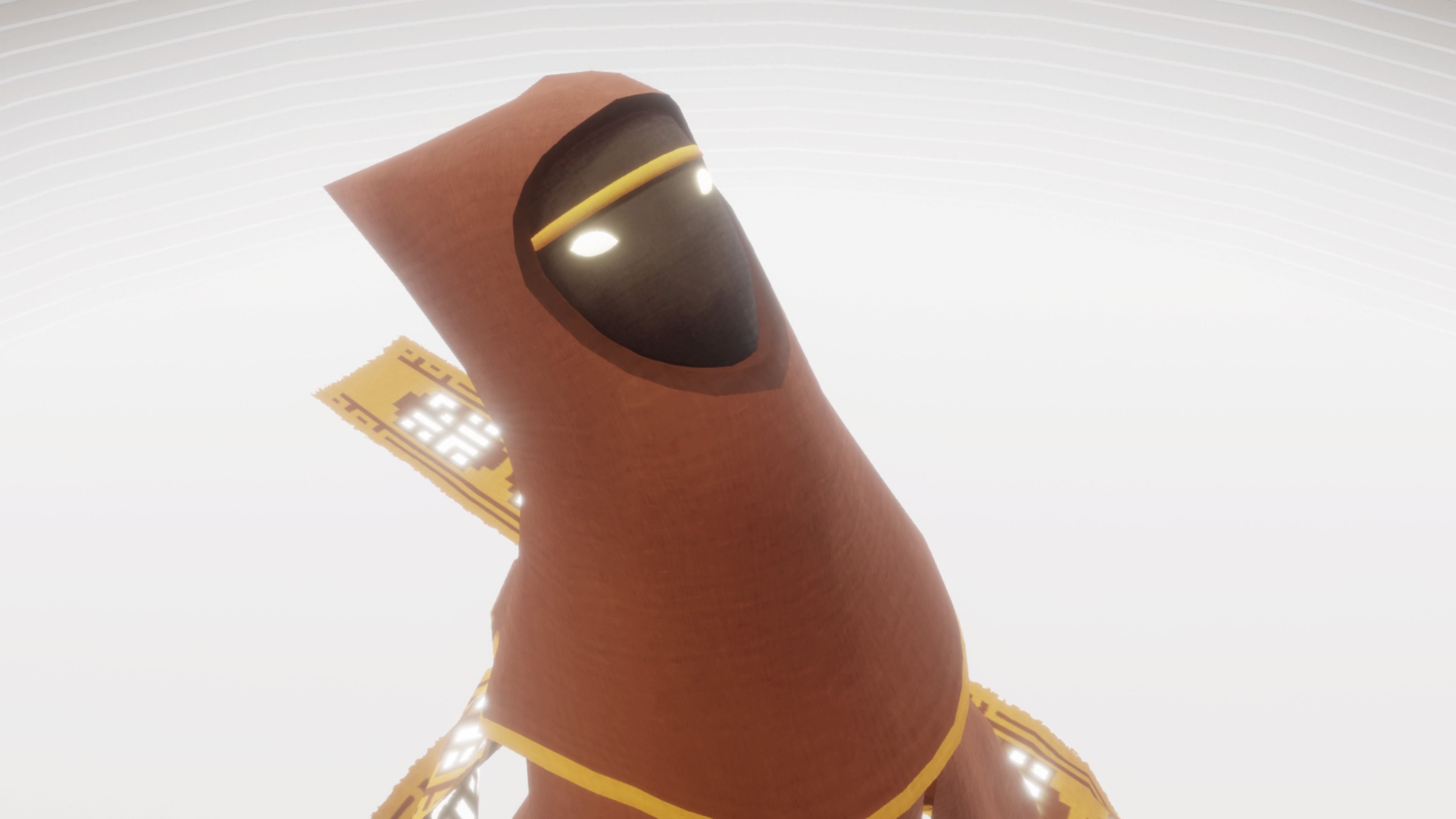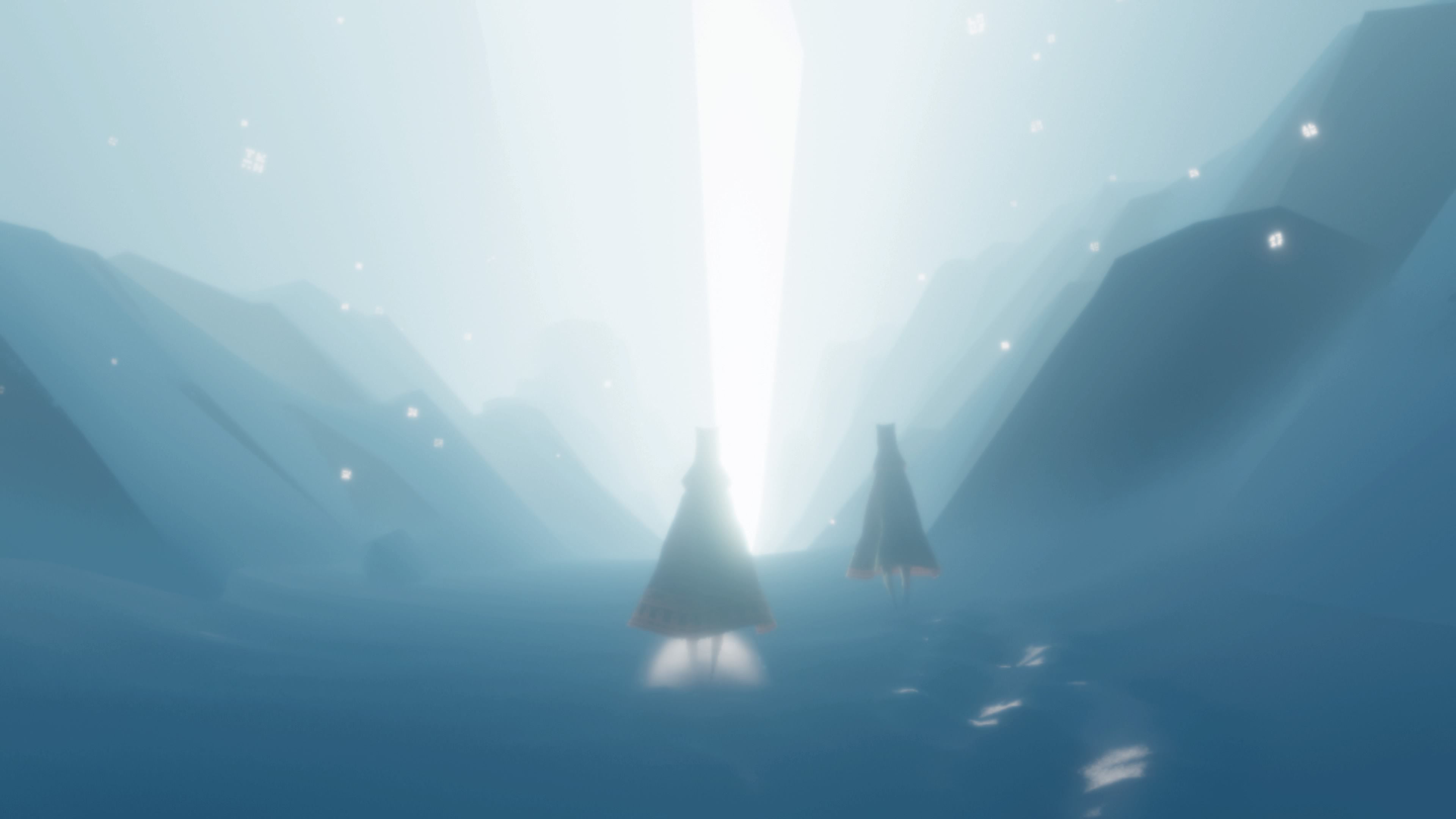
Although independent video games have existed since time immemorial, in early 2010 a new phase of indie history began as companies such as PlayStation and Xbox began to support studios and promote their efforts in different ways. This allowed video games like Journey to reach a wider audience and have an unprecedented influence on the industry. Ten years after the release, Infobae Latin Power spoke exclusively to Austin Wintory, the composer of the soundtrack that changed the lives of many, including his own.
For those who don't know or remember the title, Journey is a very particular adventure where players put themselves in the shoes of a character without gender or race on a journey through visually striking deserts. Emulating the path of the hero, in English called Hero's Journey, the title manages to generate very strong emotions without giving a word, touches on themes around life and death and does so with one of the best soundtracks of recent decades. The music impressed players and other developers, but one of the most interesting points of its gestation is that the title song, which opens the game and appears constantly throughout the album, was composed by Wintory on the same day that he met with the game's responsible studio, thatgamecompany.
— What did they tell you about the game that triggered you such an inspiration at the time?
“The funny thing is that it's hard for me to know exactly how it happened, because it's not very common. Normally, I try a lot of ideas and experiment, in fact Jenova (Chen, director of the game) told me to take a few weeks to write the song, they didn't expect to have it recorded that same day. I can hardly accept credit because it just popped up in my head. It's something that happens every once in a while, but it's quite rare. We had met for dinner a week earlier and he gave me a general idea of the game, the path of the hero and the character navigating these environments, and in the office they told me that it would also be multiplayer. I remember thinking, “Yes, of course, this is impossible,” because it was so hard to imagine, no one had done anything like that before. But everyone at thatgamecompany, in collaboration with Sony, did it. I think it's crazy even ten years later. It's still amazing.
—When a player meets others in the middle of their journey, the music expands with new instruments that represent these companions. Was it a concept that existed since the beginning of development?
— The idea was that you could experience real emotions like empathy and even love with a complete stranger. That was a priority for Jenova from the start. Can you create an online environment that doesn't lead players to hate each other? I grew up playing multiplayer stuff with my friends on the couch, but then the MMOs came, where you can get together with someone, but there are always those “Leroy Jenkins moments” where everyone wants to cooperate, but only one player is enough to ruin everything. They really found a way to make a bully and troll-proof experience. From the musical point of view I had to look for how to complement that. The main question was how to make the experience noticeably different when playing with someone else.
— What does it make you think that there are players who may never discover that aspect of the game?
“I love it. I have gone much more to the extreme in the different projects that I had after. I was more extreme in creating interactive music where, if the player chooses A instead of B, they never hear what happens on the other path, it's the idea. I want your decisions to feel meaningful. And if the two things are basically the same, then it's not really.
Apart from the emotions generated and changed lives, Journey's music is the only Grammy-nominated album in the gaming world in the history of the Recording Academy. Previously, the song “Baba Yetu”, composed by Christopher Tin for the Civilization franchise, had won a Grammy in the category Best Instrumental Accompaniment for Vocalist, but in the ten years since the release of Journey, no other video game was present at the ceremony.

— How does it feel to be the only nominee in the industry and why do you think there was no other case in a decade?
“Obviously I am very honored and was surprised to receive that nomination, but I cannot say that I like that it is still the only one. It doesn't make me proud because I'm proud of my friends and colleagues who also write great music. There have been a lot of albums that I would have loved to see nominated, I am a member of the Academy and I vote every year and I would have very happily voted for those instead of the film and TV that they usually do. It's a peculiar position, because I'm obviously grateful for the attention Journey received, but I shouldn't be the only one. Nor should it have been the first, because video game music has been eligible at the Grammys since 1999. It was ten years before one succeeded and now it's been another ten years and it's still the only one, it's weird. The Academy is an old organization and most of its members are people with roots in rock, hip hop, Latin genres and even electronic music. It's not the video game and movie composer industry. The so-called media composers are a minority, and within that group, 99% are film and TV people who don't necessarily know much about video games. Maybe they see a game on a list of candidates, but they don't know what it is. That is changing over time, but we are in the middle of a strange intergenerational moment.
Aside from having composed hundreds of soundtracks over the past 20 years and running a podcast alongside actor Troy Baker and other industry personalities, Austin Wintory also has a YouTube channel that is regularly updated with interviews with colleagues, talks about iconic music that marked him and a little behind scenes from his own work. His videos seek to break down myths of music composition and provide tools to newbies who are just starting out or interested in music from any angle.
— What led you to make the content of your channel?
“I enjoy it! (laughs) It's that simple. The composer community is not huge. You can name almost any game and most likely he has met the composer or that he is even a friend of mine. And it's not because I'm special, it's because there aren't too many composers. And I always liked meeting my colleagues, now when I see a composer who admires, I look for them and tell them that I want to meet them. Because it's one thing to be inspired by someone like John Williams, but it's different when it's someone who's at your level, talking about age and experience. We always have conversations where I ask them things and, at some point I thought “I should have a camera on when I do this”, so that others can hear their answers because they are interesting. The other aspect is that I was often disappointed that I couldn't help students who asked me for sheet music, because it's something that doesn't exist. The reality is that I don't write tracks or songs. What we write is like a toolbox that the video game is ordering based on what the player is doing. How do you explain that? That's why I started the YouTube channel that maybe is for a niche, but I've been lucky that it grew every year. So I keep spending time publishing things and we do, like, 75 videos a year.
Since the departure of Journey in 2012, Austin Wintory receives almost non-stop messages from people all over the world. Many thank him for his work, others tell him that they used some of his songs to walk to the altar in their marriage and some even thank him for helping them overcome insomnia. For this reason, for the tenth anniversary of the title, the composer published Traveler, a reimagining of Journey's music performed with the London Symphony Orchestra, which is also a letter of thanks to all these fans who shared their experiences and love over the past decade. The album can be heard on platforms and has official art by Ángela Bermudez, a Costa Rican artist and cosplayer who met Wintory through her Journey cosplay and with whom she currently lives in Los Angeles, sharing artistic projects of different kinds.
— Did you learn things with Journey that helped you in future projects?
“Not only did I learn a lot, but Journey also confirmed things to me that I theorized, but that I hadn't tried yet. If you want to sound powerful, big and emotional, you write for a single instrument. You don't need a hundred. It is not uncommon for a musician to write for an orchestra, although the general notion is that it is something magical. I'd rather be able to write a good tune than know the technical aspects of writing for an orchestra. It's like when someone writes a beautiful story, very emotional but simple, and someone else writes a much simpler story but uses sophisticated words. What is the minimum amount of music I can write and maybe move my mind or heart? It's not about the orchestra, it's always about the notes. And with Journey there was no budget to do it any other way, it had to work with what was there. I also learned a lot about musical interactivity and integration with video game design because I participated in so many thatgamecompany meetings. I wasn't just writing music and sending it so they could see how to incorporate it, I was just another developer, but only focused on music. I've never done anything like that before.
Austin Wintory is currently working on other projects that he couldn't get too ahead of us. He did anticipate that he is collaborating on an interactive musical that this week announced its official title: Stray Gods: The Roleplaying Musical. Developed by Summerfall Studios, it began its journey with a Kickstarter campaign in 2019 and plans to arrive this year with innovative mechanics focused on music and voice.

We will surely talk to Wintory again for the release of the title, but to close the interview of the day, we asked him:
— Are you a fan of your own work?
—Sometimes they ask composers something like “how do you choose what to write?” or “why is that note and not this one?” , and a common response is “I wanted to hear this piece, but no one else did it before, so I had to write it myself.” I think it's that way. It's not that I'm a fan, but I'm trying to put something I like into the world. If you ask if I sit down and listen to my own music, no, I never do. I listen to music from others, I listen to everything because I love a balanced diet. Am I my fan? I don't know, but I'm not ashamed of my work, I try to work really, really hard and try to do something I'm proud of.
KEEP READING:
Últimas Noticias
Debanhi Escobar: they secured the motel where she was found lifeless in a cistern
Members of the Specialized Prosecutor's Office in Nuevo León secured the Nueva Castilla Motel as part of the investigations into the case

The oldest person in the world died at the age of 119
Kane Tanaka lived in Japan. She was born six months earlier than George Orwell, the same year that the Wright brothers first flew, and Marie Curie became the first woman to win a Nobel Prize

Macabre find in CDMX: they left a body bagged and tied in a taxi
The body was left in the back seats of the car. It was covered with black bags and tied with industrial tape
The eagles of America will face Manchester City in a duel of legends. Here are the details
The top Mexican football champion will play a match with Pep Guardiola's squad in the Lone Star Cup

Why is it good to bring dogs out to know the world when they are puppies
A so-called protection against the spread of diseases threatens the integral development of dogs




